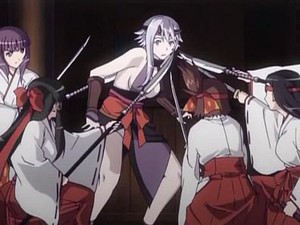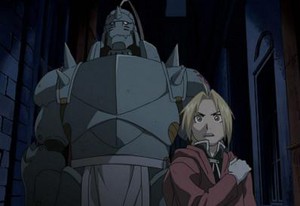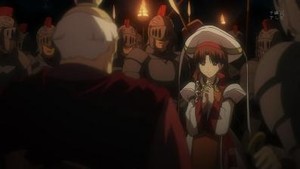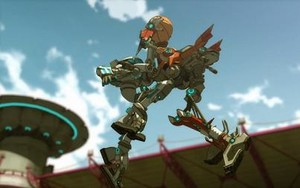The Spring 2009 Anime Preview Guide
Theron Martin
by Theron Martin,
 Hatsukoi Limited
Hatsukoi Limited
Rating: 4 (of 5)
Review: The old adage “be careful what you wish for, because you just might get it” is never truer than in the case of middle school student Ayumi Arihara, a dreamer who openly declares to her friends that she'd not only be happy if any guy confessed his love to her, but would unconditionally go out with that guy. She must put that resolve to the test when Misao Zaitsu, a beastly-looking hulk of a high school student who scares everyone, formally announces his feelings for her in a letter. Things get complicated for Ayumi when she realizes that the princely classmate she finds herself falling for is actually Misao's younger brother. What will happen if she refuses Misao? And why is she feeling even a little guilty about it? Things get even more complicated when rivals of Misao kidnap Ayumi, thinking that she's really his girl, in order to draw him into a fight.
So goes a romantic comedy which, despite a typical set-up and an overused plot device, still manages to be surprisingly funny and even occasionally sweet. Despite looking like a quite tame series for most of the episode, it also dishes out some fan service during the climax and especially in the closer. (Admittedly, though, one of the two panty-flashing scenes was part gag, part plot point.) This is based on a fairly involved shonen romantic comedy manga, so the ultimate appearance of fan service shouldn't be too surprising, but the first time it happens it still may catch viewers off guard. The artistry and music contribute well to the tone at any given time, and the character designs for the girls are just a little different from the norm for anime girls. (The eyes aren't as big, for instance, and the hair colors are a bit less bold.)
The source material was a collection of short stories about a wide cast of girls, which suggests that, like Diamond Daydreams, Ayumi won't always be the lead heroine just because she gets featured treatment in the first episode. Even if she isn't though, the first episode establishes the series more towards the high end of the Romantic Comedy Entertainment Value scale than towards the low end.
 Asura Cryin’ episode 2
Asura Cryin’ episode 2
Rating: 2.5 (of 5)
Review: So the apparent ghost Misao is actually something called a Projection Being, who is the result of some kind of human sacrifice, and she's not the only one of her type running around accompanying a human. Another character is the daughter of a prominent yakuza clan as well as claiming to be a devil. The Student Council President is also the leader of something called the “Sacred Defense Squad,” aka the group of wizard-like individuals who attacked the house in the previous episode. And oh, yes, supposedly the world has already ended once, is on repeat cycle, and is getting close to ending again.
All that, and getting to both grope and wake up beside his sexy senpai, is the kind of weird stuff hero Natsume has to deal with in just a single episode. Collectively, it all seems to be heading at least vaguely in the direction of actually making sense, though the sheer amount of varied and seemingly converging storylines going on here still gives the impression of cramming multiple different plot ideas into a blender and hitting the puree button. There may actually be some decent concepts here (what, exactly, the deal is with Misao alone merits interest), but all of the other baggage the series tosses in requires too much head-scratching to be worth the effort. Complicated plots are fine if the writers can handle them and keep things straight, but this series isn't doing so hot on that so far.
 Queen's Blade episode 2
Queen's Blade episode 2
Rating: 2.5 (of 5)
Review: In the world of Queen's Blade, every female warrior is voluptuous and, unless a shrine maiden, invariably wears the skimpiest possible clothing, whether it be armor that offers ridiculously inadequate coverage or impractical traveling clothes. It also seems that every female warrior who either aspires to participate in the Queen's Blade competition, or else is being sent by her organization to represent, has her own reason for getting involved. For Risty, it involves having the money and power to do something about unfortunate circumstances. For the shrine maiden Tomoe, who must help fend off an attack on her home compound by a giant demon toad, it is about protecting the island she and her fellow miko call home. For the demon-horned Shizuka, it may be about Tomoe.
And so goes the second episode of the season's biggest fan service fest, which seems to have fallen into Character Introduction And Establishment Mode. Though far less blatantly trashy than the first episode, the episode content still has its fair share of nudity, thong-wearing, and fantasy cheesecake content, and that's nothing compared to the rampant nudity in both the opener and the closer. The opener still isn't as intense in its fan services as the opener of the otherwise-tame mecha series Brain Powerd, but it is still eye candy unto itself. The nudity is really all that makes this one special so far, though, as the story and characterizations are nothing more than ordinary, fight scenes are somewhat limited in movement, and the normal visuals and music score are equally unremarkable.
 Phantom ~Requiem for the Phantom ~ episode 2
Phantom ~Requiem for the Phantom ~ episode 2
Rating: 4 (of 5)
Review: The young Japanese man now known only as Zwei learns a bit about the organization Inferno that he is being indoctrinated to work for, but for the most part his days are spent in training with Ein – training to shoot, training to fight in unarmed combat, and training his body in general. As he does so, he feels himself losing his sense of self, becoming exactly what he needs to be to survive his current situation: an emotionless assassin, just like Ein.
Yeah, if you look at this episode in terms of plot advancement or storytelling, not a lot actually happens here, as the series seems intent on maintaining the languid pacing established in the first episode. Not a lot really needs to happen, though, because action isn't the purpose of this episode. It is entirely about a person being brainwashed through rigorous conditioning, about the way a person can gradually die inside as they lose their sense of identity. It's actually quite sad to watch, even moreso because the viewer can see Ein as the ultimate destination that Zwei is headed towards. Unlike Kirika, her counterpart in Noir, Ein isn't struggling to regain her identity and humanity; she's just come to accept that she doesn't have it anymore, which gives her a notably different take on the same character concept.
The artistry stands in the series’ favor, especially Ein's design and those unnervingly dead-looking eyes she has and Zwei is developing. The series’ greatest strength, though, lies in its wonderful soundtrack, which may lay it on just a little too thick at times, but hey, when it's this good it's hard to mind. Overall, this is a slight improvement from the first episode and suggests that the series may be headed in a sufficiently interesting direction.
 Shinkyoku Soukai Polyphonica Crimson S episode 1
Shinkyoku Soukai Polyphonica Crimson S episode 1
Rating: 3 (of 5)
Review: Phoron, a young orphan being raised at a country orphanage, isn't good at getting along with other kids, but he sure can sing. His beautiful song one night attracts a lovely spirit named Corticarte, who is currently being pursued by unknown forces but promises to meet him again. The encounter inspires Phoron to aspire to be a dentist, a musician who can summon and control spirits with his special music (called commandia). Twelve years later Phoron has made it to a prestigious dentist school but is struggling to pass into the specialized third-year coursework because his music won't summon the required spirit. When he tries his special song again, though, a younger version of Corticarte, who has been imprisoned for the intervening years, appears and completes the contract she started twelve years ago. Now Phoron has a rather demanding and possessive spirit-girl to deal with, in addition to attracting other female attention.
Polypohnica Crimson S is the prequel to the 2007 anime series Shinkyoku Soukai Polyphonica, which was itself based on a 2006 all-ages visual novel that also has manga and lite novel iterations. No prior familiarity with the franchise is required to make sense of this one, however, as the set-up is very straightforward and the basic mechanics are explained fairly well within the episode. Except for one corny-looking scene involving another character using her music to guide a spirit beast in battle, the classic premise of music evoking spirits works – until the moment that the younger Corticarte reveals a tsundere personality, that is. The collapse of the first episode into mediocrity at that point is jarring, as except for one tender scene the final three minutes show a markedly different tone and convert the episode into a more stereotypical tsundere-focused harem story. As might be expected, the music is quite good but the artistry is generally bland, with the only impressive design being the spirit beast.
Hints about the presence of terrorists in the setting and a more darkly destructive force, as well as why Corticarte was both imprisoned and later freed, imply a Bigger Picture, which gives hope that the series won't descend too much into the typical harem/demanding girlfriend tripe. For as good as the first episode proceeds, though, it doesn't finish well.
 Tayutama
Tayutama
Rating: 2 (of 5)
Review: 500 years ago, the goddess Kikurami did battle with three other powerful Tayutai, ultimately giving up her own life to assure they were sealed away. In present day, Yuuri, son of the priest of Kikurami's temple, is called upon to investigate and do an exorcism when the remains of the tree seal are dug up during a construction project, during which he meets the spirit of Kikurami. An accident breaks the seal and releases the Tayutai, and a weakened Kikurami must resort to taking on a human incarnation in the form of a fox-eared (and tailed) girl, who is soon given the name Mashiro by Yuuri. Finding it strange that Yuuri still isn't married at his age, Mashiro decides to become his wife, but non-pedophile Yuuri agrees to it only when she's older. So, naturally, the next morning she is older – a fully-developed teenager, in fact.
It was probably inevitable that one of these “sexy supernatural wife/girlfriend” series would pop up eventually this season, as there has been a surprising dearth of them so far this spring. The premise and set-up in this one are as contrived as ever, and what would a series like this be without the obligatory female childhood friend who might eventually become a romantic rival with the supernatural girl? (And is it any surprise that this one is based on an ero game?) Not only does this one offer nothing new to its genre, but it also feels like only a half-hearted effort was given in the first episode's construction. Nothing about the series – concept, writing, artistry, music, and especially not the character designs – rises above the level of Thoroughly Mediocre. It does have a certain cute factor going for it, but that and a bit of fan service aren't enough to carry this one.
 K-ON episode 2
K-ON episode 2
Rating: 3 (of 5)
Review: Yui relishes the snacks that come with being part of the Light Music Club, but it's time for her to break down and settle on a guitar. On a visit to the mall music store she falls in love with one that happens to be out of her price range, so the whole gang agrees to get part-time jobs to help her pay for it. Mio's timidity limits their options, but eventually they find something straightforward and low-stress. Though Yui is ready to settle for something more in her price range after realizing how long it will take to get the money for it together, Tsumugi is able to use some pull to arrange a discount. Now all Yui has to do is actually learn how to play the instrument she has fallen in love with.
Let's be honest here: although the music aspect may eventually become a key component (and you still have to love that closer, which is easily one of the two best of the new season), at this point K-ON is selling itself purely on the Cute Factor. Sometimes it is charming, other times nearly nauseating, but the cuteness is unquestionably pervasive. Every character personality, every design, and every action of each of the girls seems predicated on trying to make the cast as adorable as possible, and the second episode mightily reinforces that impression. At times it actually works, such as Ritsu and Mio's bit about “occupational disease,” and the ability to appreciate heavy doses of such endearment will separate the people who will follow this show out from the people who won't. The artistic quality is still a weak point, but for what the series is doing it is, at least, passable.
 Eden of the East
Eden of the East
Rating: 4.5 (of 5)
Review: The opener is “Falling Down” by Oasis set to intriguing imagery filled with poetic quotes. Dialogue that should be in English actually is in English. The entirety of the first episode takes place in a well-rendered Washington D.C.
No, this is not your normal anime series.
If you're looking for the new season's most unusual entry, something well departed from all of the game adaptations, shonen action series, and cutesy romances, this one is it. A rare completely original production, this new directorial effort by Kenji Kamiyama (Ghost in the Shell: Stand Alone Complex, Moribito) via Studio I.G. takes a somewhat different spin on the standard ploy of the agent who wakes up with no memory and must discover who he is, what he should be doing, and why he doesn't have a memory. It does so primarily through approaches distinctly different from the norm for the genre: it actually has a light-hearted spirit (at least so far, anyway) and it runs the story of the female lead concurrently rather than as a subsidiary. Outstanding background art, appealing character designs, highly likeable lead characters, and a unique closer which looks like it was animated almost entirely with paper (pencils = missiles, crumpled paper = explosions, etc.) certainly don't hurt, either.
In the story, Saki Morimi has made a side trip to D.C. while on a senior trip to New York City because she wants to see the White House, which she regards as “the center of the world.” In front of the White House she encounters a naked young Japanese man waving a gun, to whom she ultimately lends her jacket to cover up. Later recalling that she left her passport in her jacket pocket, she has to pursue the young man. He, meanwhile, realizes he has no memory and is told in a mysterious phone call that his memories have been erased but he left a message for himself to go to a particular apartment, where he discovers a veritable terrorist's arsenal and several IDs. When Saki catches up with him, the young man, who takes the identity Akira from one of his passports, decides to go to Japan with her, leaving Saki wondering if he's the prince she's always imagined. A dire image seen at the airport threatens to upset their light-hearted spirit, however.
Beyond returning to Japan and involving some kind of secret organization and terrorist activities, the actual direction of this series is unclear at this point, but that doesn't matter. This one does everything it can to draw viewers in with its first episode and get them to want to keep watching, and many will.
 Hanasakeru Seishounen
Hanasakeru Seishounen
Rating: 3 (of 5)
Review: Kajika, a silver-eyed beauty with a business tycoon father who spent many of her formative years on an island with a pet tiger, returns to Japan after living in America for several years. There she befriends the timid Yui, who becomes Kajika's first same-age friend, and is secretly watched over by bodyguard Toranosuke, who is undercover as a student. Though she temporarily runs afoul of some thuggish types, she nonetheless safely escapes to make a visit to her father, who presents her with a stunning proposal: a game in which she will be introduced to three men hand-picked by her father to be potential suitors. If she wins – and is won over by – one of them, her father promises to reveal her long-concealed true fate.
Moreso than most other new series this season, it's hard to be sure what to make of this one. The premise, opener, and certain stylistic elements all suggest a more serious reverse harem series, though it seems obvious that Kajika may already have her eye on one particular guy, whether she realizes it or not: longtime friend Li Ren. The tone is a bit different than the norm for such series, however, and the artistry has its own distinctive, almost un-anime-like style. Kajika is also a stronger female lead than one normally sees in series like this. The structure and pacing is also a bit awkward, as the first episode spends most of its time not devoted to flashbacks to establishing Kajika in Japan, only to fly her back to America for the obligatory Series Premise revelation. In fact, the first episode never really seems entirely comfortable with what it's doing.
Nothing shown so far offers anything particularly fresh or original, so unless it improves in the next couple of episodes this one will almost exclusively be for romance fans.
 Guin Saga
Guin Saga
Rating: 4 (of 5)
Review: Timid Lemus and his prophetess sister Linda, the young twin scions of the royal family of Palo, are magically transported away when Palo's capital is overrun by Mongohl forces, but an error in the transportation sends them to the Forest of Lude in Mongohl-controlled lands rather than to safety. A chance encounter with a massively-muscled, leopard-headed man rescues them from a Mongohl patrol, after which they learn that the man only knows that his name is Guin and another name of unknown significance: Aura. Though together they brave the dangers of the forest at night, an equally grave threat awaits them in the morning.
Based on an immensely long series of novels, Guin Saga has all the earmarks of a fantasy epic in the classical sense, and that is what sets it apart from the other fantasy entries in this new season. It does not use comedy relief to lighten the mood or force game mechanics onto the structure of the content, which gives it an even and smooth dramatic flow supported by rich visuals, inventive monsters, and a nicely complementary soundtrack. (Its closer, which is reminiscent of some of Enya's work, is arguably the best of the new season and one which I fervently want on a soundtrack.) The story elements may be fairly typical of the fantasy genre – a seer, an amnesiac, prince and princess on the run who get rescued by a powerful warrior – but execution always counts, and the first episode does introduce some appealing lead characters. Lemus is pathetic, but Linda is the kind of strong, young, level-headed heroine who's easy to and root for and you have to respect a character who looks like a pro wrestler with a leopard head and can literally pound an armored man into the ground in one blow.
Of all the pure fantasy series to debut this season, this one looks like it has the most promise and staying power.
 07-Ghost
07-Ghost
Rating: 4 (of 5)
Review: In a sci fi/fantasy setting, amnesiac former slave Teito is one of the top combat performers in his military academy class, which is preparing for their final graduation test. During the deadly test, in which he and his best friend Mikage are among the few who pass, Teito encounters Ayanami, a senior officer who seems vaguely familiar. Later realizing that Ayanami is the man who killed his father, Teito tries to attack him, only to get captured. With the help of Mikage, he goes on the run, and seems destined in the next episode to come under the care of some pretty young nuns.
Bishonen guys, flowing robes, military uniforms, an overkill musical score reminiscent of Trinity Blood, a touch of mystery, and magic-fueled action spectacles are the order of the day in this sharp-looking new entry from Studio Deen. The premise could fairly be accused of lacking even a new twist on common storytelling themes, the execution has an exaggerated sense of dramatics, and the musical score does not seem to understand that restraint can actually be a Good Thing, but this opening episode does pace itself well, offer a satisfying amount of action, and reveals just enough information about the characters and situation to lay a solid foundation for the story. But really, a character named Ayanami who has that hair color? Surely I can't be the only person who had images of a certain mecha series spring to mind on first hearing his name. . .
 Fullmetal Alchemist: Brotherhood
Fullmetal Alchemist: Brotherhood
Rating: 2.5 (of 5)
Review: Of all the series out there that were truly needing or deserving a remake, Fullmetal Alchemist was not one of them. Sure, manga purists will complain that the 2003-2004 original wasn't as faithful to the manga as it could/should have been, but despite that (or perhaps because of that?), it was an enormous hit that stands as one of the best of all shonen action series. It looked great, sounded great, was well-acted in both Japanese and English and offer an exceptional mix of silly humor, butt-kicking action, and heavy drama tinged with a healthy dose of moral contemplations. It also had a powerhouse first episode practically guaranteed to make you want to watch more. This remake does not.
For all its efforts to serve up the same kind of light-hearted fun and flashy goodness which made the original series so great, this second Bones-produced effort falls surprisingly flat. It lacks the sense of drama and theatrics which the original exploited to the max, and a pathetic musical score is one of the chief culprits. This new tale about the Elric brothers’ encounter about the Ice Alchemist also just isn't compelling; it has no sense of wonder in it. Significantly lower artistic and technical merits also don't help, and the more manga-styled additions are more of a deterrent than a help. (Some manga elements should stay in their original format.)
In this version, Edward and Al Elric are still a pair of young alchemical prodigies who, a few years earlier, attempted a forbidden alchemy, an endeavor that cost Ed his right arm and left leg and Al his entire body. Ed sealed Al's soul in a suit of armor, while automail replaces his own lost limbs. Ed has become State Alchemist to further his search for a way to restore their bodies, but first they must deal with a former State Alchemist who has gone rogue and is attempting to orchestrate a vengeful plot against his former country. His does not seem to be an isolated case, either, as sinister forces move in the background.
So is it actually bad? No, not really, but it is hardly anything extraordinary.
Fullmetal Alchemist: Brotherhood is available streaming on Funimation's official website.
 Ristorante Paradiso
Ristorante Paradiso
Rating: 2 (of 5)
Review: Nicoletta, a 20-year-old woman who was originally born in Rome but has lived elsewhere for the past 15 years, has returned to visit a particular backstreet restaurant for a particular reason: her mother Olga, who virtually abandoned her after her divorce from Nicoletta's father, is married to the restaurant's owner. She's never come clean about having been previously married or having a daughter, so Nicoletta, frustrated by the inattention over the years, is determined to spill the beans. What she discovers is a rather odd place, where the entire staff is composed entirely of handsome older gentlemen who wear glasses (in some cases fakes ones), including one in particular who catches her eye. Convinced by her mother to at least temporarily fake her identity, Nicoletta finds herself at a loss for what to do next. Naturally, the restaurant is going to figure prominently into her future – or the series wouldn't be called what it is – but the first episode doesn't get that far.
That this series is based on a short-run seinen manga is quite surprising, as so far the series gives off a pronounced josei vibe instead. It has just enough mature charm that it may win some fans for its style and storytelling, because it sure won't earn many viewers on the basis of its artistry or animation. Though one scene showing in her in underwear reveals that she has an attractive figure, Nicoletta has one of the least appealing facial designs you'll ever see on a female lead in an anime series, and those blank eyes are positively creepy. The rest of the artistry is, at best, mediocre, and even claiming it has its own distinctive visual style won't explain that away. The mood-music soundtrack and a rather cute closer work better, but the mixture of Italian addresses and Japanese language sounds a little weird.
The Next Episode preview suggests that the series is quickly going to take a sexy turn, but so far, this one has little to distinguish itself unless you have a fetish for classy older men in glasses.
Ristorante Paradiso is currently available streaming on Crunchyroll.
 Tears to Tiara
Tears to Tiara
Rating: 2.5 (of 5)
Review: The High Priest of the Divine Empire Drwc has come to a small village ostensibly to insure that a Demon King, whose impending resurrection has been prophesized, stays sealed away, but in reality he seeks (in one of those typical nonsensical “rule the world” schemes) to free him in order to become the Big Boss. The key to doing that is Riannon, the village's priestess and daughter of the former ruler, who has the blood of the ancient Elf King in her veins and so is needed as a sacrifice. Riannon has a brother Arthur, the First Warrior of the village, who is, naturally, going to try to stop this. But can he arrive before the Demon King – who's actually a bishonen – has his way with Riannon?
And so begins yet another fantasy game adaptation, this time of an ero tactical RPG that was later adapted into a tamer PS3 version. (The anime apparently will more closely follow the latter version.) Even if you did not know that up front, its game-based origins would still be obvious, as everything about the look and feel of the series – especially the opener, which features oodles of stock fantasy RPG characters – just screams “I came from a game!” In this case, that's not intended as a compliment, as the set-up is as tired and mundane as they come for fantasy RPGs. Arawn (the Demon King) and Riannon are supposed to be both the lead characters and travel mates in the game, however, so apparently there won't be any actual sacrificing going on in the future. For this reason, and because the artistry is actually pretty good, waiting an episode or two to see which direction the series goes would be fair. It does not look promising so far, however.
 Cross Game
Cross Game
Rating: 5 (of 5)
Review: This is the masterpiece of the new season.
Granted, it's way too early to label the series as a whole as a masterpiece, but the first episode, at least, does absolutely everything right. It is, without question, the sweetest and most purely charming first episode of the new season, a display of purity of heart and innocence of soul free of all of the saccharine overkill seen in cutesy otakucentric series. It is also one of the season's best-written intros, with a flawless sense of timing and an elegant grace to its story of young love and baseball. It will also, quite probably, leave many viewers in tears at the end. It even has a simple but clean artistic style and an understated but highly effective musical score as complements, including a closer that may contribute to the teary-eyed effect.
In the story, the family of Ko, a fifth-grader, operates a sporting goods store. One of their best customers is the Tsukishima family, who operate the local batting cage facility. Their second daughter, Wakaba, shares a birthday and birth hospital with Ko, so they've always been close, and she is “the cutest girl in the whole grade,” while he younger sister Aoba is an aspiring baseball player. To avoid some bullies, who see themselves as rivals for Wakaba's attention, Ko joins up with a baseball team, where he proves that, while he may suck at catching balls, all his time in the Tsukishima batting cages does amount to something. His path towards becoming a baseball player now seems set, even though the twists of life can have a way of trying to interfere.
The way things play out, and the Next Episode preview, suggest that this is just a foundation episode, with the real story starting next episode with the key players at least a couple of years older. It is also not the kind of fare dedicated anime fans normally go for, as it looks to be more of a mundane sports-oriented series which skews a bit younger. However, the quality of this episode makes it worth a sample, and it may surprise you in the end.
 Dragonball Kai
Dragonball Kai
Rating: 3.5 (of 5)
Review: So you're going to go back and re-edit Dragonball Z to tighten it up and move the story along faster? Count me in!
Dragonball Z will always stand as one of the all-time classic shonen action series, but its one big fault was always a tendency to drag things out or otherwise kill time. Thus revisioning much of the wasted content out, as well as taking advantage of all of the backstory established in later episodes and movies to give the series a proper set-up, seems like a great idea for a way to expose a whole new generation of fans to the Dragonball franchise. The first episode moves along crisply, taking about six minutes to briefly summarize the original series and fit in some details about the destruction of planet Vegeta and Frieza's role in it (which, if I remember correctly, did not originally come up until the Frieza arc several dozen episodes later) before reintroducing most of the old gang and bringing to Earth the series’ first major villain, the Saiyan Raditz. This should certainly give any newcomer to the series plenty enough of a foundation to make sense of the basics before the fighting begins next episode.
This version shows its age most in its artwork, but a newly-revamped soundtrack, completely with fresh opener and closer, helps balance that out. It otherwise ages fairly well, as shonen action series really haven't evolved much since DBZ came out. If you never got to see the earliest episodes, want to see what the franchise is all about, or are just on a nostalgia kick then this one is a golden opportunity.
 Basquash!
Basquash!
Rating: 4.5 (of 5)
Review: Okay, so the concept – mecha playing basketball – sounds like some incredibly lame and cheap shonen series gimmick, and many stylistic elements are indisputably inspired by Gurren Lagann. Sure sounds like a recipe for some throwaway shonen sports/action/sci fi series.
And then you watch it, and your eyes pop out.
The artistry and animation are, in a word, stunning. This is cutting-edge CG wizardry at its absolute finest, and proves once again that no Japanese studio is even in the same league as Satelight when it comes to top-of-the-line mecha rendering and animation. It even integrates well with the regular animation, too, and is supported by fantastically detailed background art which exploits its gritty futuristic setting to the fullest. It is far and away the best-looking new series so far this year.
The story is far less remarkable but still not bad. Dan, a highly-athletic and angry young man with a mad-on hatred for Big Foot (aka mecha) Basketball due to some accident in his past which crippled his young sister, goes around terrorizing public TV screens to earn cash from their components and express his displeasure. He meets up with a busty girl he immediately discovers works with Big Foots and later discovers knows him from childhood, gets a chance to operate a Big Foot for the first time and attend a BFB league game. Dan, a diehard basketball enthusiast, is so disappointed by what he sees that he crashes the match to show everyone how it should really be done. After a year in jail for this incident, he discovers that he's fostered a sensation.
Did I mention the “busty” part? The first episode not only shows Gurren Lagann sensibilities with regards to a female character with a bouncy figure but it also, in a couple of scenes, delves heavily into sexual innuendo; one girl even looks and acts like she had an orgasm upon seeing Dan in action in his Big Foot. (She even says, “that felt good” with tears in her eyes afterwards.) If that kind of content doesn't bother you, though, then this one deserves a sampling even by those who aren't normally shonen or mecha fans. It has all the right kinds of energy and enthusiasm, but more importantly, it just looks that good.
 Sengoku Basara
Sengoku Basara
Rating: 4.5 (of 5)
Review: In a variation on medieval Japan, various territories have fallen into war with each other. Various general and warlords representing each territory maneuver for position and tactical advantage while throwing out their own elite super-powered warriors. One is red-clad dual spear-wielder Yukimura, fervent servant of the axe-wielding Lord Oyakata. Another is the blue-clad, one-eyed Masamune Date, and oh, there's a sexy blond ninja chick in a revealing costume, too. Yukimura and Date clash with cataclysmic force, and. . .
Oh, hell with it. Does the plot really matter here? This adaptation of the PS2 game known as Devil Kings in the States (my, that seems to be the recurring theme this season, doesn't it?) uses its plot as a thinly-veiled excuse to set up flashy battles, and in that respect it does not disappoint. Rather than just another boring fighter retread, though, Production I.G. tackles the subject matter with attitude, style, and a hefty amount of panache. One character rides around on a horse with what looks like motorcycle handlebars lashed to the sides of its head, going for the bad-ass biker punk look in addition to being a samurai. Another is so ridiculously overenthusiastic that he and his boss get into exuberance-fueled fights with each other (see the screencap). And then there's the stripper-ninja girl, too. The opener even features medieval warriors dancing in formation to rock beats.
In other words, this is quite the fun series to watch. It absolutely cannot be taken seriously or it loses its charm, but it does have gorgeous character designs, generally impressive artistry, and energetic choreography. It definitely won't appeal to those with no interest in a fighting-oriented action show, but shows a lot of promise within its genre.
 Valkyria Chronicles
Valkyria Chronicles
Rating: 4.5 (of 5)
Review: This one's a keeper.
In an alternate world setting resembling 1930s central Europe, the small country of Gallia is being caught in a war between the Atlantic Federation and East European Imperial Alliance over the mineral Ragnite, which Gallia has in abundance. As the Imperials approach one particular town, the Town Watch, including one Alicia, seek to evacuate the people, arrange defense, and, in Alicia's case, deal with an apparent spy who instead turns out to be Welkin, the carefree son of a venerated General. When Imperial soldiers attack them, Welkin and Alicia flee to meet up with Welkin's sister Isara, who's something called a Darksen (which is connected to an evil figure in the land's mythology, apparently). The trio gets pinned down in the General's house until Isara reveals that they have a little toy in storage that might help. . .
Handsome character designs, excellent overall artistry, solid animation, a well-grounded story, a highly appealing female lead, a cute closer, and even some tense but not over-the-top action – what more could you want from a first episode? Its only negative (and really the only reason I'm not giving it a 5) is that it resorts to thinly-veiled info-dumping at one point, but at least viewers have a very clear sense of the situation. A-1 Pictures, a subsidiary of Aniplex, uses a static pattern effect for some of the color filling that is similar to, but far more subtle than, the effects Gonzo used heavily in Gankutsuou, which seems a curious choice but isn't a distraction.
Though based on a strategy RPG for the PS3, this one does not give the same kind of “crunched into game mechanics” feel that other game adaptations tend to have; in fact, you'd think it was an original production or based on a novel if not aware of that fact up front. A game adaptation cannot earn much higher praise than that.
 Pandora Hearts
Pandora Hearts
Rating: 4 (of 5)
Review: Young Master Oz, heir to one of the four great ducal houses of the land, just wants to have fun in the hours leading up to his coming-of-age celebration, so he brings along his willing kid sister Ada and less willing manservant (boyservant?) Gilbert for the ride as he explores the old mansion where the ceremony will take place. An accident leads to the discovery of a solitary grave and an old watch which ticks away a haunting tune. Within that tune lies a disturbingly real hallucination about a girl trapped in a room of dolls, one who want to kill him. Coupled with visions of a dire calamity it leaves Oz uneasy – and he may have good reason to be concerned, since dark forces seem intent on infiltrating his ceremony.
If the artistry and technical merits were a notch or two better and the producers dropped a couple of annoying manga-style character reactions, studio Xebec might have a real winner on its hands here. Even without those, it still gets off to the most promising start of any series so far this season. Its success comes not from it being terribly original, but because what it does do with its story elements, it does well. The pacing is less frenetic than most of the other series so far this season, which allows the story to set up a stable and sensible foundation to support the sinister creepiness that permeates later on. A palpable sense of danger gradually builds, creating a nice balance to the overblown reactions in the more light-hearted moments.
If a series that operates smoothly on a slow, steady burn suits your tastes then this one is definitely worth a look.
 Shangri-La
Shangri-La
Rating: 4 (of 5)
Review: Kuniko, a pink-haired girl gets released from some kind of juvenile lock-up into a post-apocalyptic world where carbon markets rule all. Though groomed to one day be the leader of something called the Metal-age, she has little interest in her destiny, instead preferring to run around “like the wind,” hang out with a transvestite friend, and toss around a rather devastating boomerang. Despite her cheery disposition, her capabilities seem inhuman, and at least two other strange young girls also pop up in positions of power. In other words, Strange Stuff is going on.
Like all too many other series starting out this season, this one opens with a certain level of incomprehensibility, but at least some aspects of the series make sense. A future world where economies depend on carbon credits has just enough foundation in current evolving realities to have a ring of credibility to it, no anime fan will bat an eye at seemingly super-powered girls, and that boomerang is bad-ass enough to achieve a certain “cool” factor on its own. Kuniko has enough rebellious charm to carry a series, and enough mysteries swirl around – without being too oppressive – to keep a viewer intrigued.
The biggest selling point, though, is the artistry. Gonzo has created a lush and interesting sci fi setting full of buildings overgrown with plant life and other exotic elements and backed it with some of the season's best animation to date. Really, though, the girl with the two-different-colored-eyes gimmick is a tiresomely overused design despite how sharp she looks.
Still too early to say for certain that this one will be a success, but so far it shows more promise than most.
 Shin Mazinger Shōgeki Z-Hen
Shin Mazinger Shōgeki Z-Hen
Rating: 1.5 (of 5)
Review: So there's this female giant robot whose pointy breasts are actually the twin cockpits for its identical twin female pilots. And there's a lead villain named Dr. Hell, as well as another villain who still walks around giving orders despite his head and body not being attached. And lines like “this fist is the genesis of all” or an attack named Big Bang Punch.
Um, yeah.
This remake of Go Nagai's original early ‘70s Mazinger Z manga and anime series has probably been long-awaited by old-school mecha fans, and they're the only ones likely to enjoy it. Others will probably find it hopelessly corny. That the series starts with a first episode titled “Finale,” which seems to be the frenetic culmination of a couple of dozen episodes of storytelling – and thus makes no sense whatsoever – does not help matters, either. Really, whoever invented the notion of starting a series with a full episode of conclusion as a way of leading into the main series needs to be found and beaten severely for fostering this overused and intensely annoying gimmick. A few minutes at the beginning to build up enthusiasm for the rest of the series is fine, but sorting out a whole episode of this is like waking up face down in a trash can after a serious bender and trying to figure out not only how you got there, but also why you don't have any pants but do have fuzzy bunny slippers on your feet. (Not that I know anything about this from experience, of course.)
Of course, this might make some sense if you have actually seen the original Mazinger Z series (I haven't) or are drunk enough that you can laugh at the absurdity of all of this. It certainly does retain an old-school visual style to go with its more modern technical merits, and its vocal performances have all the classic over-the-top zest. If giant robot series aren't normally your thing, though, then stay well away.
 Natsu no Arashi episode 1
Natsu no Arashi episode 1
Rating: 3 (of 5)
Review: Ready for some whacked-out weirdness dressed up as slice-of-life reminiscing? There's really no other accurate way to simply describe a first episode which looks like its creative staff was all communally taking puffs from some massive bong during the production. It has an odd artistic style, an odd animation style, an odd habit of doing overhead shots and having character name tags floating around by the characters in various scenes, and those aren't half as odd as what actually happens – and that's saying a lot in this case.
The story is told as a flashback to the time when narrator Yasaka was thirteen years old, living in a house with his grandfather and a seemingly unrelated teenage girl named Arashi. They both work at a café with several other girls and another boy Yasaka's age, and Yasaka has apparently created something he calls a “Strawberry Bomb,” which is a normal strawberry on the outside but filled with all manner of powerful spices on the inside. Okay, that and some other odd but seemingly innocuous comments are a little weird but not too abnormal, nor is one character's obsession with strawberry shortcake. The show turns truly bizarre when first Arashi, and later one other girl working at the store, start jumping through time with one of the boys, changing into their schoolgirl costumes as they do so. And apparently, when traveling back in time, you start to fade out if you get too close to your past self.
Scratching your head yet? Based on a manga by Jin Kobayashi of School Rumble fame, the first episode just drops the viewer into the middle of what is clearly a broader story without any explanation or even a solid sense of what it's supposed to be. It definitely has sci fi and comedy elements, the opener and some of the camera angles suggest a vaguely ecchi leaning, and it has some truly creative visuals, but who is it really supposed to be for? And what is it really about? This one might have a lot of potential if it ever explains itself, as it certainly doesn't feel like a “same-old, same-old” series.
Natsu no Arashi is currently available streaming on Crunchyroll.
 Asura Cryin’
Asura Cryin’
Rating: 2.5 (of 5)
Review: There might be a good series somewhere amidst the profound clutter of story elements which pack the first episode to bursting, or it might be total garbage. It's just too hard to tell at this point because the first episode seems intent on throwing everything at you just to see what sticks. As a result, nothing makes any sense at this point. Much moreso than normal, the next couple of episodes of this 13-episode series will determine its fate.
What can be said with certainty is that Tomoharu, the hero, has been accompanied by a pretty ghost named Misao whom only he can normally see and hear ever since surviving a plane crash three years earlier, a ghost who changes her clothes and uniform just like any teenage girl and doesn't seem to do anything besides hang around Tomoharu; she even sleeps when he does. (One question that probably won't be addressed: does he get up-skirt peeks when she's floating around like that?) There are vague hints that something special might be going on with her beyond just a not-unwelcome haunting, but, naturally, the first episode is much too early to spill the beans on that. Regardless, the ghost-girl-companion thing is a somewhat intriguing story element on its own; a fairly interesting series could probably be built around that alone. Instead, producer Seven Arcs (Nanoha, Sekirei, White Album) tosses in a dual eye-color priestess who is a classmate, a secret agent-type who is an upperclassmen, a wizardly figure, a pyrokinetic, secret organizations, and oh, yes, we can't forget the mecha at the end, either – and all of this is in addition to a slice-of-life series’ normal complement of more mundane high school characters. Everyone seems interested in something alternately called Extractor or Asura Machina, which may be the black mecha but that's hard to say at this point. And this is only a 13 episode series, too!
In short, the first episode overloads in its attempt to introduce everything at once and the series tries to do more than it really needs to do, and it doesn't have strong enough technical merits to blow viewers away with just its look. Enough people will watch the second episode just to figure out what the hell is going on, but it will have to come together better than this to keep its viewers coming back for the whole series.
 Arad Senki -Slap Up Party-
Arad Senki -Slap Up Party-
Rating: 3 (of 5)
Review: Slap Up Party is Gonzo's name for their adaptation of the Korean MMORPG Dungeon and Fighter (called Arad Senki in Japan), which was itself inspired by Capcom's Dungeons and Dragons: Shadow over Mystara arcade game. (So why didn't they just call it Dungeon and Fighter: The Animation?) Its fantasy RPG origins are unmistakable; in fact, you'd have to go to Ragnarok the Animation to get a more blatant example of RPG mechanics in action. Fortunately, this one takes after Ragnarok in no other meaningful way. While hardly a masterpiece, it is miles better because it doesn't take itself anywhere near as seriously, doesn't let itself be a slave to the game mechanics, and actually has credible music and technical merits.
The story opens with a party of adventurers’ intrepid efforts to destroy the source of a demon-transforming curse (including one of their members succumbing to the curse to strike the final blow), an effort that seems to backfire. Thirteen years later a young man named Baron, who is a Demon Knight because of a sealed demon-cursed left arm, wanders the land with a big sword and genie-like familiar, encounters a high-flying Gunner named Cabensis, and gets caught up in a goblin attack on the town. A mixture of grim heroics and comedy antics ensues.
The visual style somewhat resembles a more lush-looking version of Gurren Lagann and the way it bounces back and forth between serious and perversely silly content is more reminiscent of Fullmetal Alchemist Its monsters may have a laughably generic look, but the soundtrack is solid and the video game-styled closer almost single-handedly makes the whole episode worth watching. It's also (at least so far) completely clean, so if Queen's Blade disgusted you then this one might be worth a look.
 Mom's Life (Manichi Kaasan)
Mom's Life (Manichi Kaasan)
Rating: 3.5 (of 5)
Review: Reiko Kamohara has a war photographer for a husband and two young children at home, all of whom can be sources of both joy and frustration. In this collection of short vignettes, Reiko must deal with issues common to motherhood, such as children writing on walls or sleeping in her bed, or simply wanting to keep a special snack to herself. She also gets caught up in less common endeavors, such as getting carried away with doodles in a communications book sent back and forth between her and her kids’ preschool teachers or wondering if her working husband is watching the same moon as she is.
“Slice-of-life” is not an appropriate name for this kind of comedy; think more along the lines of domestic humor, which will probably put this series beyond the interest of the vast majority of American anime fans out there. However, if you're looking for a more dramatic change of pace from more glitzy fare then this one might be a pleasant surprise. Its vignettes are decidedly oriented towards motherhood, but some of them are funny enough and/or sweet enough that they can be appreciated even by those who haven't associated with little kids lately. The artistry is clean but basic, but this isn't content where flash really matters. Mom's Life is all about the situations it presents, and that it does pretty well.
 K-ON episode 1
K-ON episode 1
Rating: 2.5 (of 5)
Review: The school's light music club is facing imminent suspension due to its entire membership graduating the previous year, so incoming first-year student (and prospective drummer) Ritsu decides to make the club her pet project and drag her friend Mio (a prospective bassist) along. When prospective keyboardist Tsumugi also expresses interest, they find themselves only one member short, but the only other applicant its klutzy ‘fraidy-cat Yui, and she doesn't know how to play anything, much less the guitar they need. Given that none of the rest of them are very good, either, that hardly stands as a barrier.
Actually it's not a bad concept, as people who aren't naturals having to learn how to play is not an approach that has commonly been taken in previous music-centric anime. While none of the girls offer anything fresh at this point, their interactions and behaviors can be entertaining, and the closer in particular is sharp – or would be, if the animation and artistic quality amounted to anything.
But that's where the big problem lies here. Even a strong concept would be weighted down by rough, wobbly artistry and substandard animation, and this is only a decent one. The artistry looks rushed, as if it never passed through the final refinement stage typical of even run-of-the-mill productions these days. That the girls (with the possible exception of Mio) uniformly look too young to be high school students doesn't help. This one might be watchable if it cleans up its look, but otherwise it's a pass.
 Phantom ~Requiem for the Phantom
Phantom ~Requiem for the Phantom
Rating: 3.5
Review: Boy, Bee Train sure likes their emotionless girls and girl assassins, don't they? They are apparently hoping that those who got hooked on the likes of Noir and (to a lesser extent) Madlax will eat this one up, too, and it's quite possible that they will be proven right. After all, it has everything that made the former two compelling: a sexy girl assassin (only this time paired with a guy instead of another girl), loads of mystery, a strong musical score, and quality production values that include some well-animated action scenes; in fact, this may be the best-looking series Bee Train has made yet.
The series features a young man named Zwei, apparently a Japanese tourist in some unnamed country, who gets drawn into a covert organization named Inferno, where he is brainwashed, encouraged to show off his prodigious natural instincts for killing, and teamed up with the organization's top assassin, a seemingly emotionless young woman named Ein (she's the first and Zwei's the second, you see) who is code-named “Phantom.” The first episode drops the barest hint that Ein is making some kind of connection with Zwei that she hasn't with anyone else, but this wouldn't be a Bee Train mystery-assassin series without something like that.
Will that be enough to make this one a hit, though? It certainly looks good (and so does Ein!), but the pacing is just a little slow and this episode suffers from a retread feel. If it can show a new spin on the genre in the next couple of episodes then the series might hold serious promise.
 Hayate the Combat Butler Season 2
Hayate the Combat Butler Season 2
Rating: 3 (of 5)
Review: The first season of Hayate the Combat Butler aired for 52 episodes beginning in the spring of 2007 – a highly successful run for an action/comedy which heavily employs otakucentric references. Apparently it sustained enough popularity to justify not only a one-episode OVA release in March 2009 but also a 13-episode follow-up TV series, which continues the (mis)adventures of debt-ridden teenager Hayate Ayasaki as the fledging butler for the ultra-wealthy 13-year-old Nagi Sanzenin. If this is your first exposure to the series, fear not; the first couple of minutes explain the basic premise and the entire episode progressively introduces all of the key players in Hayate's universe. The characterizations are all straightforward enough that, by the end of the first episode, even a total newbie should have a general understanding of what's going on.
And what is going on is just more of the series' standard antics. This episode entirely lacks the anime/manga parodies that have traditionally been scattered through the series' content, and does take a while for its funny train to get chugging on down the tracks, but it packs in enough laughs on its back end to make watching it worthwhile, as well as (gasp!) actually offering a plot development at the end. This time the notoriously exercise-phobic Nagi gets cajoled not only into participating in her school's traditional long distance runs but also into making a bet about Hayate's continuing employment which is conditional on her winning. Predictable complications and obstructions ensue.
This season retains the very average artistic merits of the first season and offers a lackluster new opener paired with a closer featuring Student Council President Hinagiku. It does not represent the franchise at its sharpest but shouldn't disappoint fans of the first season too much.
Note: Hayate the Combat Butler Season 2 is currently available streaming on Crunchyroll.
 Queen's Blade episode 1
Queen's Blade episode 1
Rating: 3.5 (of 5)
Review: One character walks around with a halter top that looks like two hands reaching down to cover her nipples, hands which occasionally move to expose them or squeeze her breasts to create something akin to milk bombs. Another character gets stripped down to her G-string and wets herself from fear within the first couple of minutes, and most of the female cast look like they stepped out of a fantasy-themed Carnivale parade
Trashy? Absolutely, but at least this series makes no pretense about what it actually is: an ero fantasy RPG done in anime form. Its paper-thin plot – which seems to involve a princess named Leina who'd like to emulate the bad-assery of her twin and older sister (both accomplished warriors), but currently requires a female outlaw named Risty to help get her out of jams – is really just an excuse for full-figured young ladies in skimpy clothing to strut (or fly) around, fight each other with weapons and flashy supernatural attacks, and bare lots of skin. Fortunately production studio ARMS, whose résumé primarily (but not exclusively) consists of hentai and heavily ecchi titles, understands well that for such a title to be successful, it cannot skimp on the detail in the fan service and has to provide more than just that. In this case it's high production values, which include an ambitious musical score, mostly nice artistry, a bit of creativity in the bad girl's abilities, and a fair amount of pop in the action scenes.
Queen's Blade will never be recognized as a classic and it certainly has no depth, but for what it is, it's surprisingly good.
 Chi's New Address ep 1-4
Chi's New Address ep 1-4
Rating: 3.5
Review: Chi, the young cat who found some loving owners in last year's series of shorts, is now causing a pressing dilemma for his owners, since their apartment complex doesn't allow pets. As much as he loves to play with the boy Youhei, and as much as Youhei's parents like having Chi around, they decide that it might be best for Chi to go live with some relatives in Hokkaido, where he could run around outside whenever he wants. Doing so breaks Youhei's heart and is nearly as difficult for his dad, though, so they ultimately seek other options when a new opportunity presents itself.
Okay, so this is hardly sophisticated stuff, but this is kid's fare, and for what it is, it's pretty good. The 3-minute time frame, which includes almost 30 seconds of intro, severely limits what can be accomplished with each episode, but they come out frequently and spin a sweet little story about a lovably cute, playful, and easily distracted cat. Chi is so darned cute - and the cat sounds so realistic - that cat lovers should eat this up, and the fairly basic artistry and animation don't change that.
discuss this in the forum (656 posts) |
this article has been modified since it was originally posted; see change history
back to The Spring 2009 Anime Preview Guide
Season Preview Guide homepage / archives